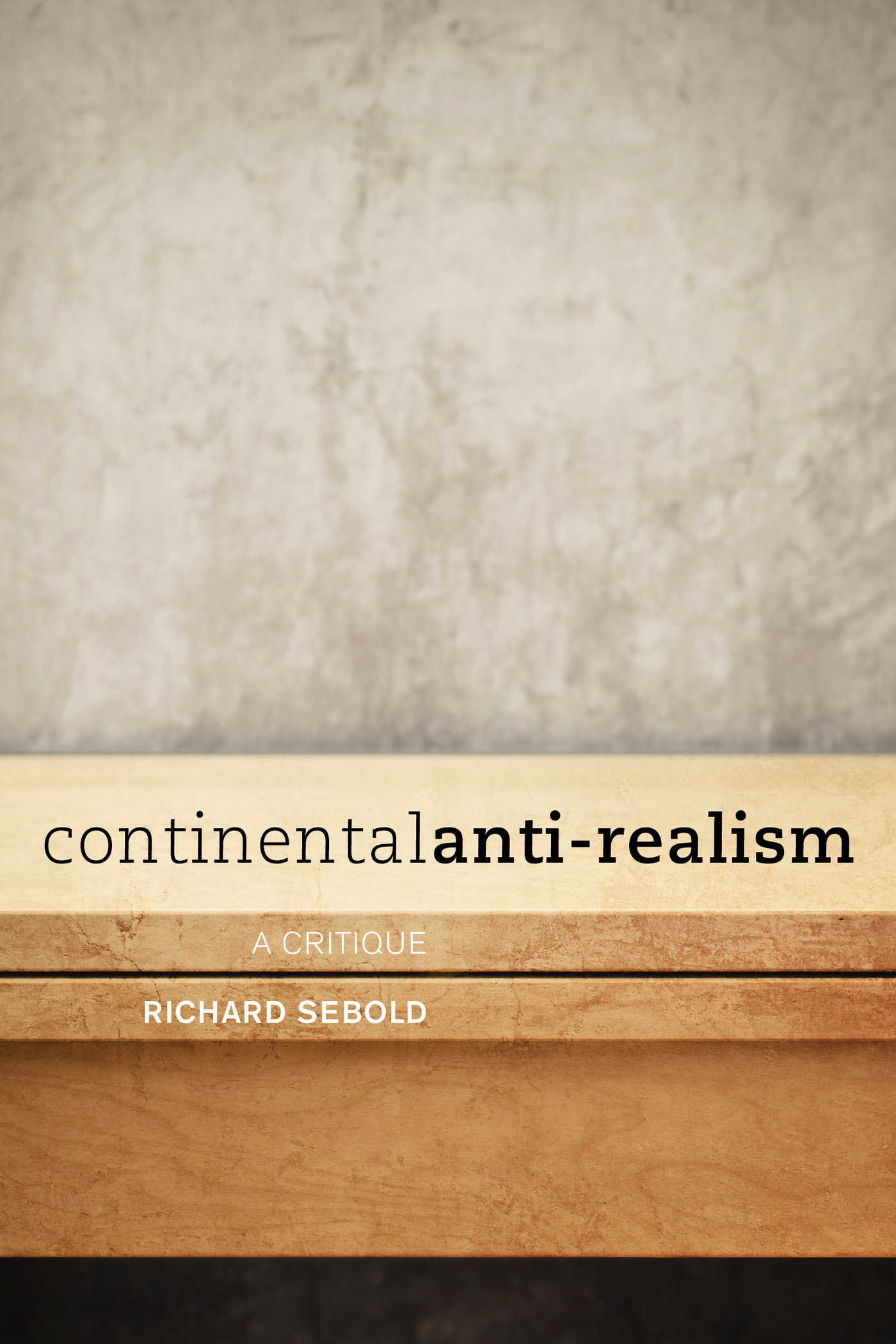Continental Anti-Realism
Continental Anti-Realism
A Critique
Richard Sebold

London New York
Published by Rowman & Littlefield International, Ltd.
Unit A, Whitacre Mews, 2634 Stannery Street, London SE11 4AB, United Kingdom
www.rowmaninternational.com
Rowman & Littlefield International, Ltd. is an affiliate of Rowman & Littlefield
4501 Forbes Boulevard, Suite 200, Lanham, Maryland 20706, USA
With additional offices in Boulder, New York, Toronto (Canada), and London (UK)
www.rowman.com
Copyright 2014 by Richard Sebold
All rights reserved. No part of this book may be reproduced in any form or by any electronic or mechanical means, including information storage and retrieval systems, without written permission from the publisher, except by a reviewer who may quote passages in a review.
British Library Cataloguing in Publication Information Available
A catalogue record for this book is available from the British Library
ISBN: HB 978-1-78348-178-1
ISBN: PB 978-1-78348-179-8
ISBN: EB: 978-1-78348-180-4
Library of Congress Cataloging-in-Publication Data
Sebold, Richard, 1982
Continental anti-realism : a critique / Richard Sebold.
pages cm
Includes bibliographical references and index.
ISBN 978-1-78348-178-1 (cloth : alk. paper)ISBN 978-1-78348-179-8 (pbk. : alk. paper) ISBN 978-1-78348-180-4 (electronic)
1. Analysis (Philosophy) 2. Continental philosophy. 3. Anti-realism. 4. Kant, Immanuel, 17241804. 5. Hegel, Georg Wilhelm Friedrich, 17701831. 6. Nietzsche, Friedrich Wilhelm, 18441900. 7. Husserl, Edmund, 18591938. I. Title.
B808.5.S395 2014
149'.2dc23
2014027978
 TM The paper used in this publication meets the minimum requirements of American National Standard for Information Sciences Permanence of Paper for Printed Library Materials, ANSI/NISO Z39.48-1992.
TM The paper used in this publication meets the minimum requirements of American National Standard for Information Sciences Permanence of Paper for Printed Library Materials, ANSI/NISO Z39.48-1992.
Printed in the United States of America
Acknowledgements
The following work is a modified version of my doctoral thesis for La Trobe University. Countless people along the way to publication have played a role in shaping the outcome of this work whether through inspiration or casual conversation, but several deserve special recognition.
First, I would be remiss if I did not thank my former fellow postgraduates of the philosophy program at La Trobe. In addition to providing a collegial environment where critical (and lighthearted) discussions were always welcome, they have also been good friends and have provided an essential social escape from the often tedious work of completing a thesis and bringing it to print. A few postgraduates in particular are owed a special debt. To my officemates Paul Barry, Stanley David Wood, and Nik Alksnis, thanks for creating a friendly space where work could be accomplished in between letting off steam. Sherah Bloor, David Rowe, and James Burrowes were invaluable sounding boards and foils for specific chapters of my thesischapters 3, 5, and 6 respectively. Without them all, my thesis and my life would be significantly impoverished.
I am also grateful to various members of staff and audience participants who provided feedback after talks presented at various venues including the Australasian Association of Philosophy conferences, the Australasian Society for Continental Philosophy conferences, the La Trobe Philosophy Staff Seminars, and a workshop on the analytic/continental divide held at the University of Dundee. These opportunities would not have occurred if it were not for the generous support of the Faculty of Humanities and Social Sciences and the School of Communication, Arts, and Critical Enquiry at La Trobe University. Not many postgraduates get the level of support that I have been fortunate to receive.
My biggest intellectual debt, by far, is owed to those who have functioned in a supervisory role throughout my doctoral candidature: James Chase, Andrew Brennan, and Jack Reynolds. With his extensive knowledge of just about everything, James kept me honest about the analytic philosophy and provided a useful contrasting perspective on the continental figures I discuss. He also read several chapters and served as a much needed editor and critical eye. Andrew helped shape the overall way the work is presented and proffered insightful comments about the various issues I raise but especially about the nature of realism and the philosophy of Kant. To my principal supervisor Jack, the most thanks are due. He not only made himself available to discuss my progress throughout the various stages of my work, but also produced timely and encouraging feedback on the entire draft and was not afraid to be critical when needed. He was also instrumental in introducing me to fellow philosophers within the Australasian community and abroad from which I have been able to learn and bounce ideas off.
The publication process has also been an extremely enjoyable experience thanks to the wonderful team at Rowan & Littlefield International. Sinad Murphy as assistant editor and Stephanie Scuiletti as production editor did a fantastic job in helping navigate me through all the necessary steps of turning the manuscript into something fit for publication. Greatest thanks are due to Sarah Campbell, editorial director, who saw potential in the topic of my work and took a chance on commissioning it for publication. I hope the final product has come close to meeting that initial promise.
For all this and more, I consider myself extremely lucky.
Chapter 1
Are Continental Philosophers
Anti-Realists?
1.1. Background
In 1951 at a Parisian caf, a meeting of minds took place between the philosophers A. J. Ayer, Georges Bataille, Maurice Merleau-Ponty, and the physicist Georges Ambrosino. Among many things discussed, one particular issue seemed to highlight a divergence of outlook that made it difficult to carry out a genuine philosophical debate. Here is how Bataille recollects the event:
It so happened that I met A. J. Ayer last night, and our reciprocal interest kept us talking until about three in the morning. Merleau-Ponty and Ambrosino also took part.... We finally fell to discussing the following very strange question. Ayer had uttered the very simple proposition: there was a sun before men existed. And he saw no reason to doubt it. Merleau-Ponty, Ambrosino, and I disagreed with this proposition, and Ambrosino said that the sun had certainly not existed before the world. I, for my part, do not see how one can say so. This proposition is such as to indicate the total meaninglessness that can be taken on by a rational statement.... I should say that yesterdays conversation produced an effect of shock. There exists between French and English philosophers a sort of abyss which we do not find between French and German philosophers.
Ayer echoes this last sentiment in his own remembrances of the meeting and other occasions:
it might have been expected that Merleau-Ponty and I should find some common ground for philosophical discussion. We did indeed attempt it on several occasions, but never got very far before we began to wrangle over some point of principle, on which neither of us would yield. Since these arguments tended to become acrimonious, we tacitly agreed to drop them and meet on a purely social level, which still left us quite enough to talk about.
Next page
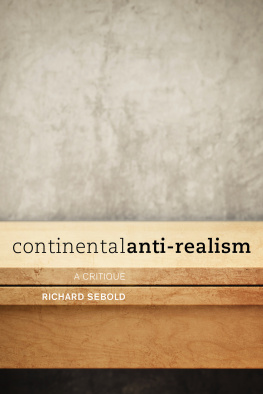
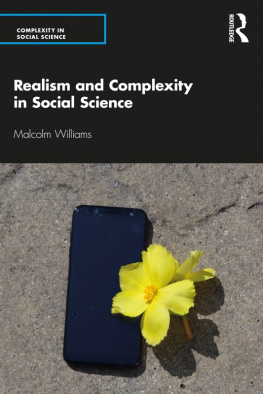
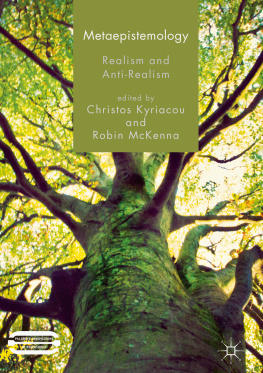
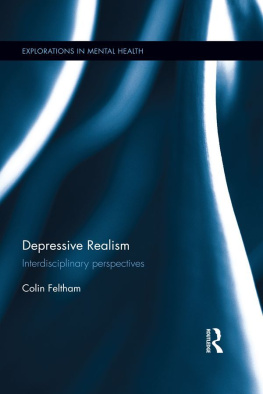
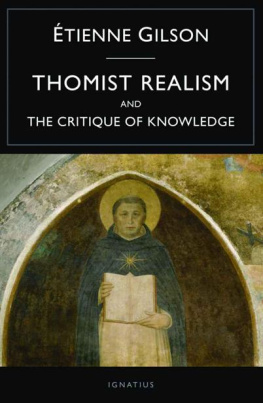
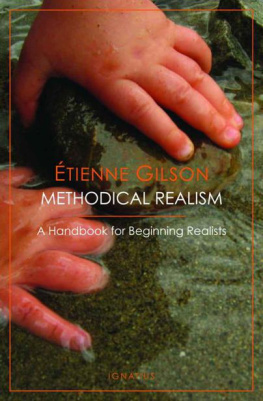

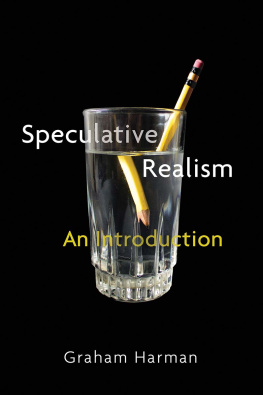
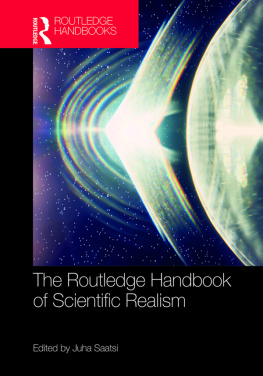
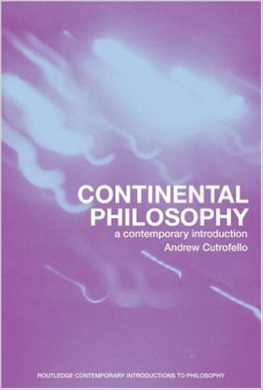
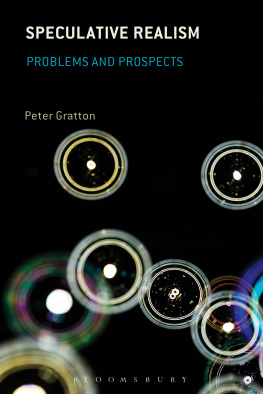

 TM The paper used in this publication meets the minimum requirements of American National Standard for Information Sciences Permanence of Paper for Printed Library Materials, ANSI/NISO Z39.48-1992.
TM The paper used in this publication meets the minimum requirements of American National Standard for Information Sciences Permanence of Paper for Printed Library Materials, ANSI/NISO Z39.48-1992.